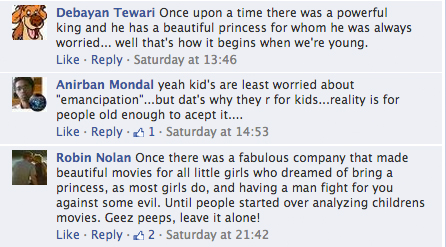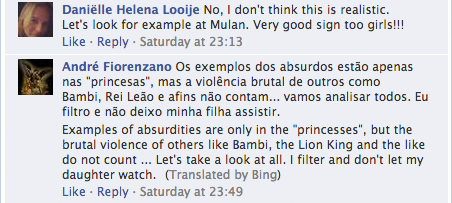Disney and Feminism: At loggerheads?
Our Facebook wall got exciting on Saturday, when we posted this picture:
(I must say here that we only posted this picture. I am not sure who should be credited for this analysis, but whoever you are — well done!)

Maybe Disney does work magic; with 42 likes, over a 100 shares, 10 comments and almost 15,000 views this has been one of the most popular post on ASAP’s wall. It also earned us 12 new followers!
But this does not mean everyone liked what we posted. Some viewers were pretty unhappy that children’s movies were being dissected.

In the defense of Disney movies: they are fun to watch, and from my own example I know that they don’t maim you for life. Yet, I cannot help but wonder if Disney’s narratives, thanks to some very good marketing, have trumped alternative versions, and even rendered the original fairytales invisible. The originals are harsher, as one of the viewers pointed out, and offer darker perspectives.

The old fairy tales very often tell us true stories with a fantastical twist. But Disney’s versions mask everything that is “too harsh” or “too ugly”, and turn many of these contemplative tales into simplified stories of dreams, happiness and magic. Disney’s success then reflects the parental urge to protect children from the harsher realities of adult life.
Which is fair, and maybe very natural, only children are not oblivious as adults think they are. With that in mind, I posed a question to our viewers:

Unfortunately that got a few “likes”, but did not generate as much discussion as I was hoping it would. In any case, I strongly believe that it is unfair to children that the alternative world of make-believe almost always takes root in traditional values.
The traditional or heteronormative family has held a hegemonic place in our society, and so have traditional notions of child rearing. In spite of campaigns, real-life examples and success stories, plenty of people still believe that single women are not capable of raising their children, women who have had abortions are incapable of being good mothers, and lesbian or gay couples cannot raise a child.
Similarly, does our comfort with the traditional norms of child rearing stop us from offering children alternate lenses through which they can view the world? Maybe Cinderella just ran away from her poor living conditions instead of waiting for the princes’ ministers to show up at her door with a slipper. Maybe Ariel just decided to tell the prince she was different from him instead of trading her voice for legs? And maybe Beauty decided to see if there was a world beyond men; her choices being Gaston, who stalks her, and the Beast, who is emotionally abusive! Maybe they all decided there was nothing wrong in not being a princess at all!
That brings me to two more comments on Facebook, one of which is in Spanish with an English translation below.

True on both counts! The male characters also mirror patriarchal ideas of courage and retribution, and questioning them will do young boys a world of good! And as for young girls, we don’t need to deny them Disney but simply help them pick and choose their models.
Or we can simply urge our children to get out of the Disney mode and read alternate versions of their favourite stories. Maybe if they are asked to look at the world through multiple lenses they will learn to be less afraid of the “harsh realities” and more critical of dominant ideologies.






